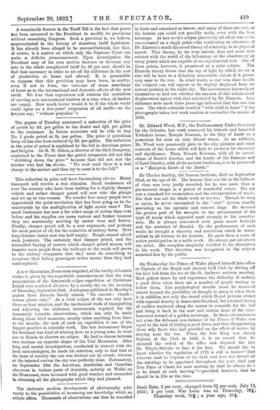A remarkable feature in the Tariff Bill is the fact
that power has been entrusted to the President to modify its provisions without consulting Congress. Such a provision is, we believe, unprecedented in the history of American tariff legislation. tt has already been alleged to be unconstitutional, but that, ef course, is a matter on which only the Supreme Court can make a definite pronouncement. Upon investigation the President may of his own motion increase or decrease any rate in the whole complicated tariff by 50 per cent. should he find that necessary in order to set off the difference in the cost of production at home and abroad. It is permissible to suppose that this provision may have been, in reality, even if not in form, the outcome of some searchings of heart as to the international and domestic effects of the new tariff. We fear that experience will confirm the unwisdom of erecting new international barriers at a time when all larders are empty. How much better would it be if the whole world could agree on a five years' suspension of all tariffs—as the lawyers say, "without prejudice" I


































 Previous page
Previous page